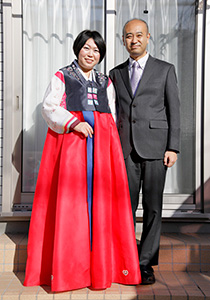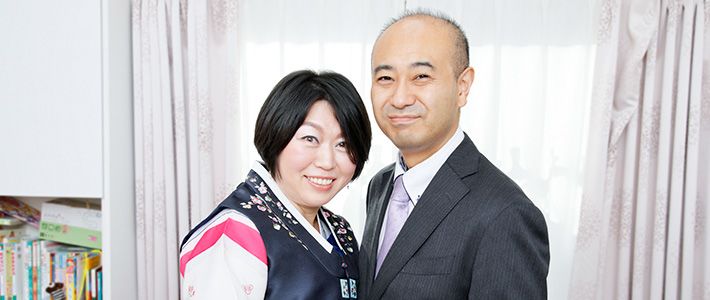
Sketches of International Marriage
Cross-Cultural Ties: Matrimony Through the Eyes of a Japanese and South Korean Couple
Society- English
- 日本語
- 简体字
- 繁體字
- Français
- Español
- العربية
- Русский
Nishikiori Shūhei and Kim Hyun-jung gladly confess to being shutterbugs. “It’s special to share the same hobby,” says Hyun-jung. Husband Shūhei has earned recognition for his talents behind the lens, taking first prize in the tourism category of a 2016 photo contest run by the Japanese Embassy in South Korea. Hun-jung says she currently has her hands full caring for the couple’s two young children, but that she looks forward to being able to dust off her camera and head out photo hunting with her husband again soon.
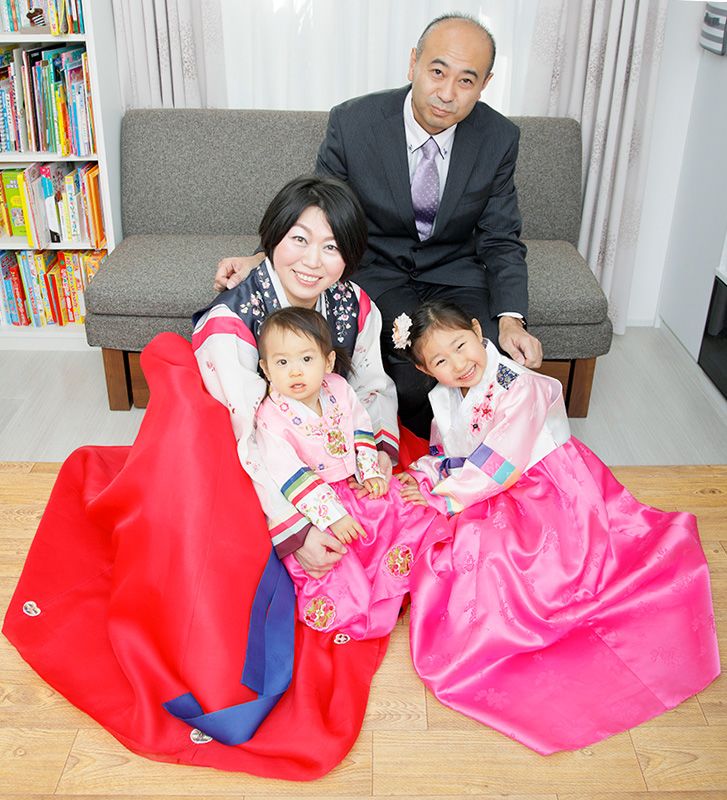 Shūhei poses with his wife Hyun-jung and two daughters dressed in traditional Korean chima jeogori.
Shūhei poses with his wife Hyun-jung and two daughters dressed in traditional Korean chima jeogori.
Cupid’s Unanticipated Arrow
Shūhei and Hyun-jung first met in South Korea in 2007 when a mutual friend introduced the couple. The fateful encounter came as Shūhei, a K-pop fan, was finishing up a three-month language study in Seoul. Feeling a connection from the start, Hyun-jung accepted her future husband’s invitation to visit him in Japan. “I was excited to have a foreign friend,” she says with a smile, emphasizing that her intentions were wholly innocent.
Apparently unconvinced, her friends and family began discussing the possibility of marriage upon her return home. Hyun-jung blames this on Shūhei for taking her to meet his parents. “In South Korea this is the same as announcing a couple’s engagement,” she exclaims. “I liked him, but I was more than a little surprised that he introduced me to his folks.”
Although smitten with Hyun-jung from the first moment he saw her, Shūhei shyly denies that the meeting was a setup. Nonetheless, his parents quickly became enamored of his bride to be. His mother in particular, a fervent fan of the popular South Korean television drama Winter Sonata, enthusiastically embraced Hyun-jung and even went so far as to take her measurements with the intention of stitching her wedding gown. Once Shūhei arranged a rendezvous between both sets of parents, the deal was sealed. Close to a year after meeting the couple wed.
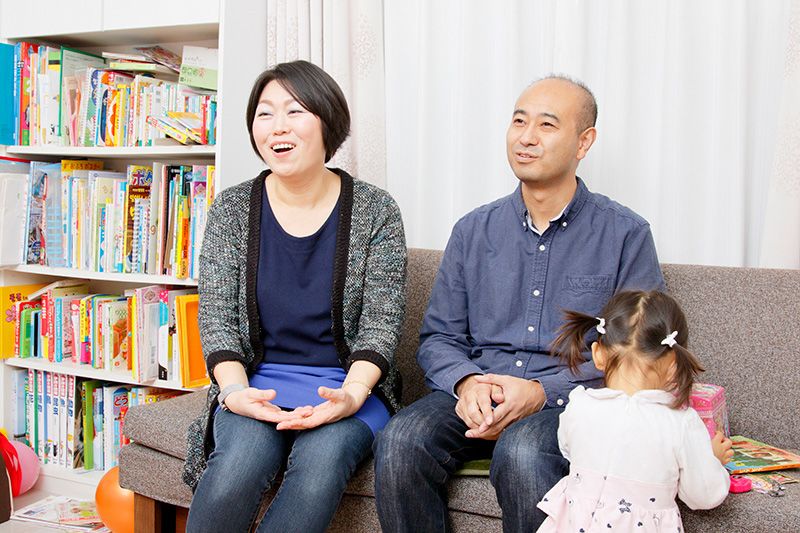 The family’s bookshelf is filled with stories in both Japanese and Korean.
The family’s bookshelf is filled with stories in both Japanese and Korean.
Traversing the Cultural Divide
The couple strikes a pleasant balance of characters, with the loquacious Hyun-jung acting as a foil to the soft-spoken Shūhei. Despite their swift trip to the altar, Hyun-jung says she had early doubts. “In Korea men are expected to be attentive to their girlfriends,” she explains. “If a woman is wearing high-heeled shoes then the man is expected to call a taxi to save her from walking.” She was surprised, however, to discover a different reality awaiting her in Japan. Chuckling, she recalls that during her first trip to Japan her soon-to-be husband paid not the slightest attention to her pumps, dragging her around by bus, train, and on foot. “I was a little surprised since he had seemed so thoughtful when we were in Korea,” she explains. She eventually forgave Shūhei for his insensitivity, though, after learning the elevated cost of hailing a taxi in Japan.
There were other instances of culture shock, but these were not enough to convince Hyun-jung to give up and return home. “The Japanese approach to dating was certainly an eye opener” she says, “but I decided to marry Shūhei after seeing how well we both got along with the other’s parents.”
Learning to Live Abroad
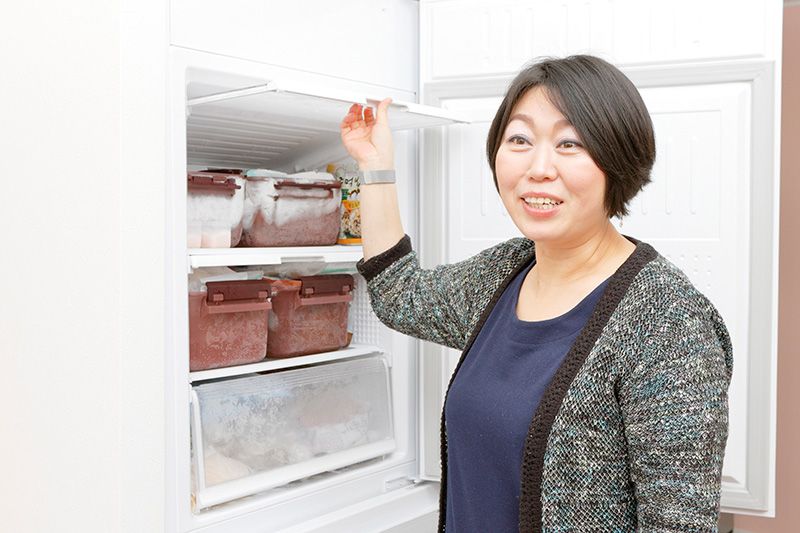 Along with the family’s regular refrigerator, they have another one specifically to store the regular shipments of kimchi Hyun-jung’s parents send from Korea.
Along with the family’s regular refrigerator, they have another one specifically to store the regular shipments of kimchi Hyun-jung’s parents send from Korea.
Hyun-jung was a relative novice to Japan when she came to live in the country, speaking only a little of the language. One thing that has required some getting used to is the sweetness of Japanese cuisine. Boasting a love for spicy fare—the hotter the better—she was surprised to find how often Japanese dishes call for sugar. “Even Korean restaurants make dishes on the sweet side to match the tastes of Japanese clientele,” she points out. Instead of fighting the tide, though, she has learned to fuse the flavors of both countries. She remains a stickler for authenticity when it comes to kimchi, however, and even has a dedicated refrigerator for storing the spicy dish.
Hyun-jung has also had to learn her way around as a mother and on occasions has run head-on into the reality of traveling with small children. With a hint of exasperation she retells her experience of taking her sick child to the doctor: “I don’t drive, so I sat my daughter in her stroller and headed to the station. It was still early and the train was packed with commuters. When I tried to board, one of the passengers growled that I had a lot of nerve riding the train with a stroller during rush hour. Children tend to be broadly accepted on public transportation in Korea and I never imagined something like this would happen in Japan. I felt utterly dejected.”
She is quick to point out, though, that it hasn’t all been trials and tribulations. She speaks glowingly about how children at her daughter’s kindergarten are taught to carry their own backpacks. “I think this is a great idea. Korean parents often do too much for their children, but Japanese kids are expected to be somewhat independent early on.”
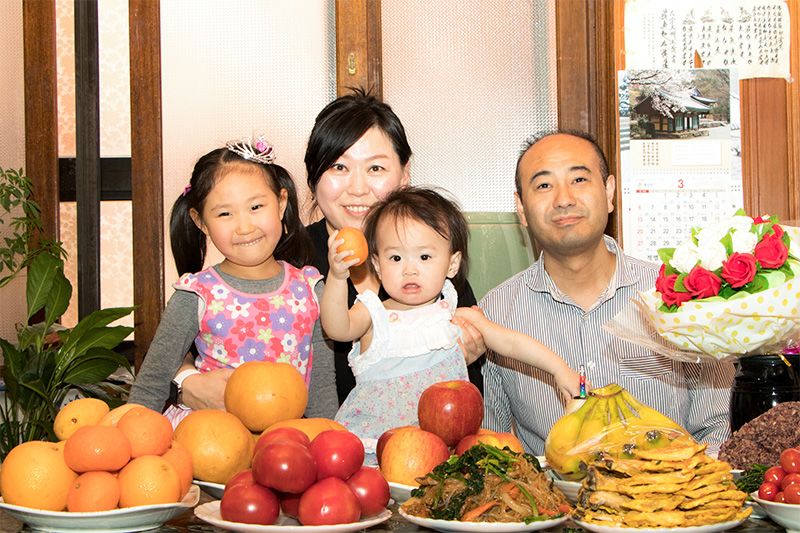 The family in South Korea celebrating youngest daughter Eri’s first birthday.
The family in South Korea celebrating youngest daughter Eri’s first birthday.
A Second Home in Korea
The couple enjoys their tipple and often shares a few glasses of beer to relax after a long day. Both profess a fondness for knocking back drinks, but note they now remain sensible about their intake. “We’re no longer spring chickens,” Shūhei chuckles. “Having children has shown us the importance of taking better care of ourselves.”
The family tries to visit Hyun-jung’s relatives twice a year, in the summer and at the New Year. They hope to one day purchase a second home in South Korea so they can travel back and forth more frequently. Shūhei asserts that they are in no rush, though. “We are content enjoying our time together as a family,” he says, adding bashfully that he does look forward to going on a date with Hyun-jung once the children are a little older.
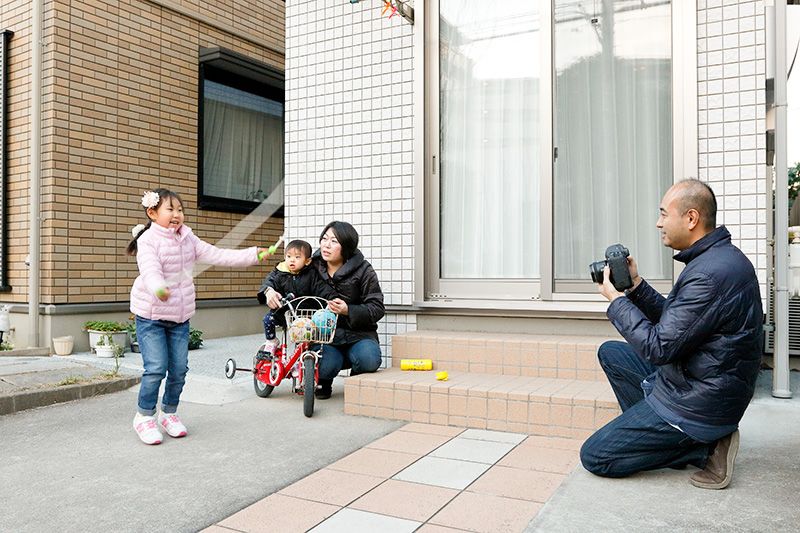 Shūhei is a first-rate photographer who says his favorite subject of focus is his family.
Shūhei is a first-rate photographer who says his favorite subject of focus is his family.
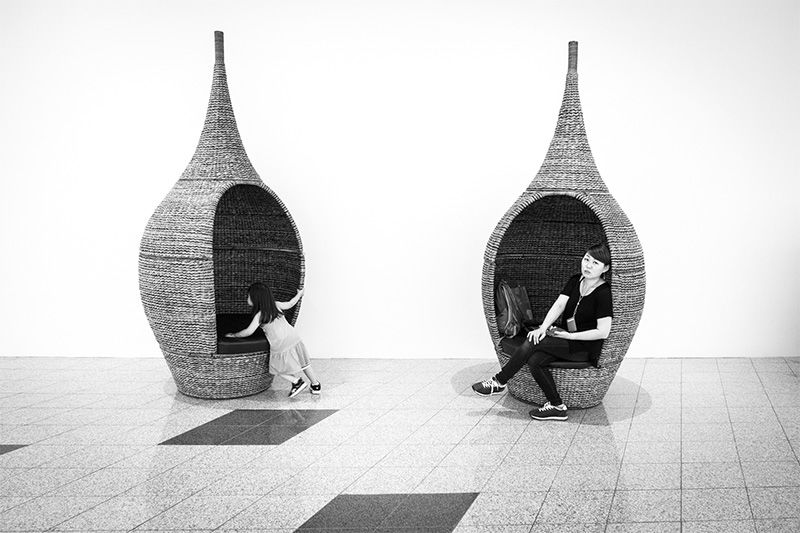 Shūhei’s snapshot of Hyun-jung and daughter Yūri was included in an exhibit sponsored by camera maker Canon.
Shūhei’s snapshot of Hyun-jung and daughter Yūri was included in an exhibit sponsored by camera maker Canon.
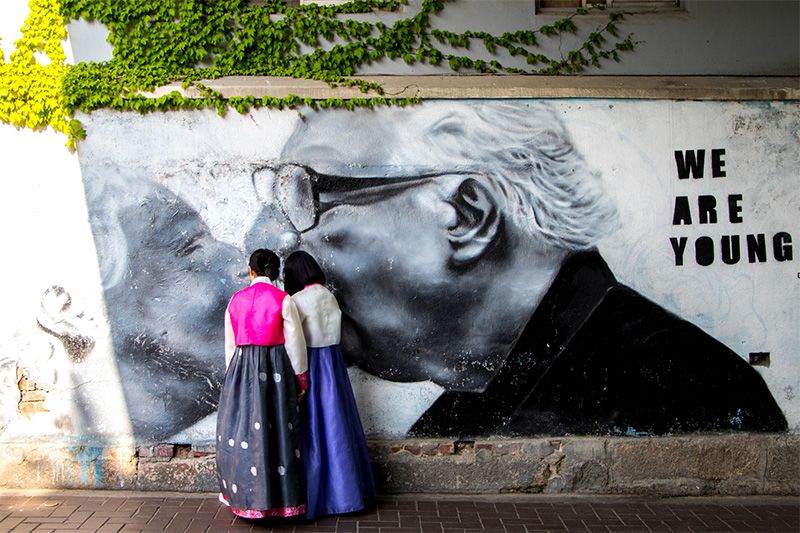 This shot by Shūhei won top prize in the tourism category of a joint Japan-South Korea photo contest.
This shot by Shūhei won top prize in the tourism category of a joint Japan-South Korea photo contest.
Shūhei and Hyun-jung Q&A
Q What did you say when you proposed?
Shūhei Hyun-jung was having a rough time with her job, so I promised that I would never put her through any hardship.
Q What language do you speak at home?
Hyun-jung We spoke Korean at first, but since our eldest daughter started kindergarten we’ve been using more Japanese.
Q How are the chores broken up?
Hyun-jung I do most of them, but Shūhei does the dishes and runs the washing machine.
Q Who runs the household budget?
Hyun-jung Shūhei gives me money for household expenses, and I do the monthly budgeting.
Q How do you refer to one another?
Hyun-jung From when we were dating I called Shūhei chagiya, a familiar term in Korean meaning “you.” The children started copying me, though, so now I call him Shū-chan and he calls me Hyun-jung-san.
Q How often do you visit Korea?
Shūhei Around twice a year.
Q What special rules do you follow as a couple?
Shūhei We avoid talking about history and politics. We also avoid watching sports matches between Japan and South Korea.
Q How did you celebrate your last anniversary?
Shūhei We had dinner at the restaurant where we held our wedding reception.
Q What did you give your wife for her birthday?
Shūhei She enjoys cooking, so I gave her a French-made cast-iron pot.
Q How do you make up after a fight?
Hyun-jung The person who feels the most sorry apologizes first.
Q What do you like about your husband and what is something you would like him to change?
Hyun-jung I love how kind he is, but I would like him to show more affection. He won’t hold my hand when we’re in Japan.
Q How about your wife?
Shūhei She is very passionate and kind. I would like her to take better care of her health, though.
(Based on an interview by Yanagizawa Miho. Originally published in Japanese on February 27, 2017. Photos by Yamada Shinji except where noted.)